 |
Organic Society
How a People Fulfills its Vocation
Plinio Corrêa de Oliveira
In this process of the interactions of dynamisms that we discussed in recent articles (here, here and here), there is a moment when God touches a people with the tip of His finger and it takes on a vitality, producing something memorable.
What is this point toward which everything is oriented from the moment God touches that particular people?
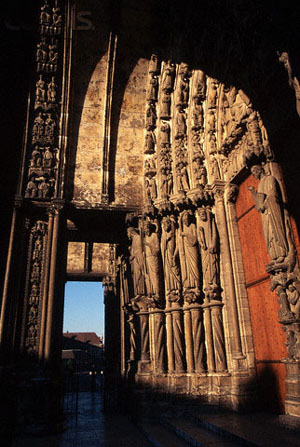
Chartres Cathedral, an expression of the Plan A God has for France |
I am not supposing that God acts without considering the context of the situation, like someone who abruptly enters a scene and gives an entirely new direction to the events. Rather, I propose that God normally acts through second causes. And these second causes typically have their own dynamisms, which also enter the divine plan. He created them, and they concur in doing what God wanted them to do.
Another thing to add is that man has a liberty to act which is both admirable and terrible. An important factor in this equation is his asseitas,(1) that is, the principal characteristic of his being that he needs to fulfill. This asseitas, or vocation, is part of an ensemble of the plan of God, and man can spoil it. When man does not accomplish what God wants in His Plan A, man may drag History to Plan B. Sometimes God allows man to do this; at other times, He annihilates that man, remediates the evil done, and continues on with His desired plan.
In its first phase, each people is a kind of draft of what it should be; it has a potential, like that of a child has. A child, as an embryo, has the personality that the man will have later. His formation and external circumstances will act over that embryo. Man himself will act over his own person in different ways.
There is a Plan A for that man, which God reveals to him at a certain moment. If he does not follow it, he will be always a deficient individual, frustrated, like someone whose foot was deformed in an accident and cannot walk well. He is not following the ideal plan for which God created him and does not progress normally. God may take mercy on him and help him to walk, but this is already another matter.
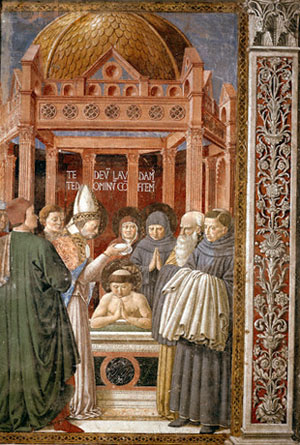
The natural mother-son dynamism played a role in the conversion of St. Augustine |
God can intervene in the life of a people or a man in a miraculous way, as in the case of the conversion of St. Paul. But generally He acts through second causes, as in the case of the conversion of St. Augustine. That is, God took advantage of the mother-son relationship with all of its special dynamism - lived by St. Monica as a saint and lived by St. Augustine as a sinner - to produce the final victory of the saint over the sinner.
In every people that starts to develop, there is a divine plan. It must be said that it is not necessarily a great plan. Not every people is called to be what ancient Egypt was at the time of Ramses II. It can be a modest plan. But if that people is faithful to it, all the dynamisms of the various families and groups will develop in an excellent way and will produce something original, that is, the explicitation of the initial promise of God.
The culture and institutions of a people go forward following this development. The march of a people in History is marked by this interactive dynamism. When a people brings to fruit everything implicit in its original asseitas, it fulfills its role in History.
The march of a people from its embryonic phase to its plenitude can be described as its process of making its particular message explicit for itself, for History and for God. When a people follows the path of this self-explicitation, all its parts achieve a harmony that perfects the process of the interactions of dynamisms as it marches toward its self-achievement.
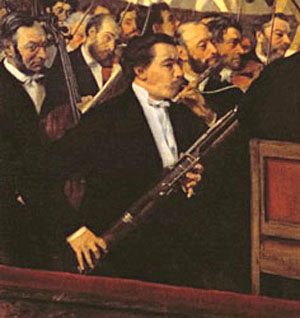
A people is like an orchestra where each
musician has his part to play |
This process will be increasingly perfect to the measure that the people follows its process of self-explication and to the measure that the most profound aspects of each one's personality find appropriate expression.
A people can be compared to an orchestra where each person, including the man who strikes the little triangle with the steel beater, plays his part so that the orchestra achieves an excellent harmony. The man who strikes the little triangle should not be discouraged because he was born to play only that modest role, for at a certain moment in that people's symphony, the tones he makes give to the ensemble a touch so delicate and filled with a shiny silvery joy that it contributes to the quintessence that people was called to express. He becomes a virtuoso because he plays his instrument at the right moment.
Cruising slowly down one of the main channels of Bruges-la-Morte in Belgium, a tourist comes upon a turn that reveals a house characteristic of the city. Suppose a woman living in that house, a simple lady of the house who has no idea she can be performing a historic role, has hung a charming lace curtain on a window.
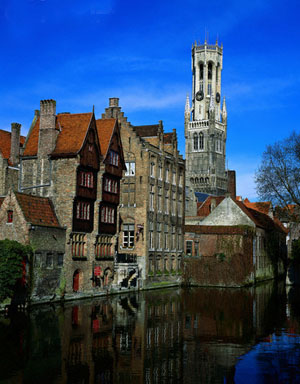
The ensemble of Bruge can be represented in a single detail on a house |
When that tourist sees the curtain, in a flash he understands everything about Bruges-la-Morte and what it represents. It is that curtain that makes the whole physiognomy of the city explicit in his mind. What triggered that process was that small curtain. Thus, the lady who arranged her curtain in her house, like the man who performed the little triangle in the orchestra, performed a role in the symphony God wants that city and that people to play.
What is extraordinary in Europe is that at a certain period almost all the peoples of Christendom were reaching their plenitude of self. Because they were following something close to their Plan A of God, even some small nations became magnificent works of art of God. Holland is one of these; Belgium is another.
If the latter had nothing but the Grande Place in Brussels and the splendid sauces of a restaurant where I dined with some friends (I am sorry but its name escapes my memory at this moment), one could say that Belgium achieved its role. It may not have realized its Plan A in everything, but in these points it corresponded to the first plan. For this reason it holds a place of honor among all the nations that have honor in the world. This is what constitutes the honor of a nation: to have accomplished something of the initial plan that God had for it.
From this comes the principle that the interactions of dynamisms of a people will be vigorous and head toward perfection to the degree that it makes explicit the original message it received from God. Each people must play its own role in the universal symphony that gives glory to God. When a people express this message, it reaches an apex, a plenitude that is magnificent.
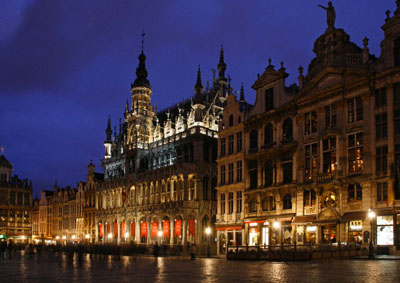
The Belgium people is explicitated in the Grand Place of Brussels |
All the dynamisms flow together in a communicative harmony, so that in the same historic epoch the man who is a calligraphist reaches the height of his art at the same time that the greatest poet of that people needs a calligrapher to write his poems. At the same time, the architecture characteristic of that people is reaching its full expression. The vocation of each one interacts with the vocations of the others in such a way that the ensemble constitutes an unum, a unity in that variety, which becomes the principal characteristic and the charm of that people.
When this takes place in the people, the asseitas of each man tends to blossom by means of a rich dynamism that is directed outwards. This is the hour of God for a people. It is like the summer for plants, when the growing season is at its height. There is no fatalism in these actions of peoples, such as there is no fatalism in saying that summer brings plants to their height. This does not exclude the role of the gardener, who sows, cultivates and harvests the plants. The role of the gardener remains the same. He has to take advantage of the summer, but he is not the one who makes the seasons change.
When everything reaches its perfection at the same time by the same people, the result is a magnificent synchrony revealing the unity of that people, which is better than each one of its parts. This is the apogee of a people. Each element gave everything, and the ensemble was oriented to achieve the plan pre-established by God in the government of History.
Is it possible to show this ideal to a people?
It is, and doing so can have the effect of a resurrection for a people who abandoned its vocation, its asseitas. But to show the ideal, it is first necessary to at least catch a glimpse of what is that initial plan of God for that people in History. This is a grace that we can ask from Our Lady on our knees.
A people may refuse its Plan A and develop wrongly. At some point, however, the hour of mercy may sound for it and God may try to reconstruct it by making a new star shine on its horizon, inviting it not only to return to Plan A but to achieve Plan A+A: a canticum novum (a new song) to be sung for the glory of God for all eternity.
This happened with Charlemagne. In him the old ideal of the Roman Empire continued. After the Pope crowned him Emperor, he considered his Empire to be a continuation of the old Roman ideal of Empire. But he also raised the Germanic world with him, for the new Caesar was a characteristic German. In Charlemagne all these dynamisms we are studying had an inebriant interaction, and from this Europe was born. It was he who sang the canticum novum, he assumed with love all the inheritance of the past and presented it in a new way.
1. Asseitas or aseitas in Scholastic language is the characteristic of the being who exists per se (a se) and not per another (ad alio); In its proper meaning, it is the character of the being who is per se, id est, whose existence does not come from another; is uncreated. It is an attribute proper to God. In its extended meaning, it is the character of what is per se, what has its own existence (Paul Fouquié, Dictionnaire de la Langue Philosophique, Paris: PUF, 1962). In the text asseitas is used analogically as the principal ontological characteristic God gave a man that he has to develop in order to perfectly fulfill himself and the divine mission God gave him.
To be continued

Posted January 27, 2012

  | | Prof. Plinio |
Organic Society was a theme dear to the late Prof. Plinio Corrêa de Oliveira. He addressed this topic on countless occasions during his life - at times in lectures for the formation of his disciples, at times in meetings with friends who gathered to study the social aspects and history of Christendom, at times just in passing.
Atila S. Guimarães selected excerpts of these lectures and conversations from the transcripts of tapes and his own personal notes. He translated and adapted them into articles for the TIA website. In these texts fidelity to the original ideas and words is kept as much as possible.

Related Topics of Interest
 Discerning the Historic Roles of Nations Discerning the Historic Roles of Nations
 Discerning the Dynamism of Individuals & Peoples Discerning the Dynamism of Individuals & Peoples
 Peoples who Disappear, Peoples who Remain Peoples who Disappear, Peoples who Remain
 The Personality of Charlemagne The Personality of Charlemagne
 The Conversion of St. Augustine The Conversion of St. Augustine
 The Perfect Societies: Church & State The Perfect Societies: Church & State
 Proportion between the City and the Man Proportion between the City and the Man

Related Works of Interest
|
|
Organic Society | Social-Political | Home | Books | CDs | Search | Contact Us | Donate

© 2002-
Tradition in Action, Inc. All Rights Reserved
|
 |
|